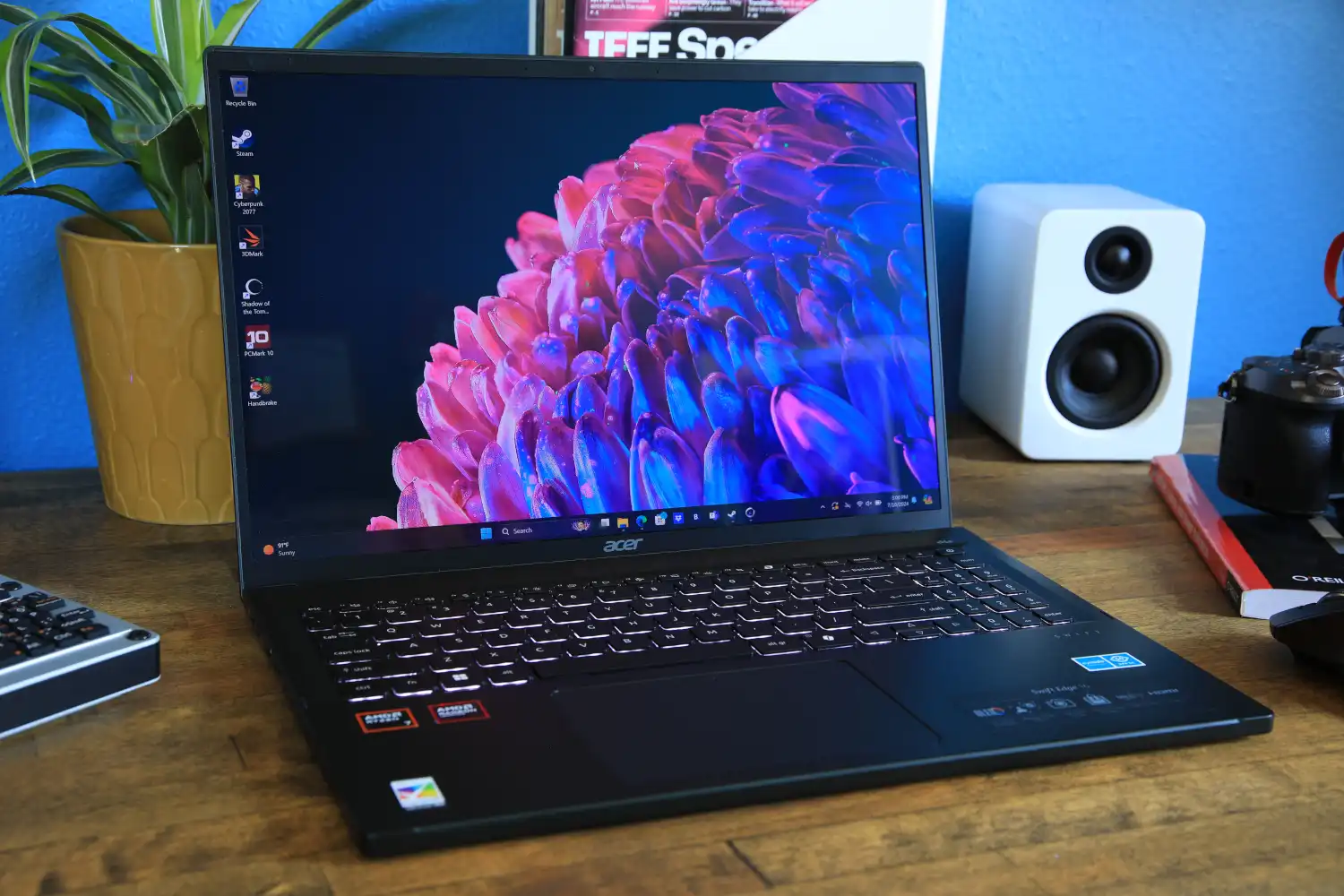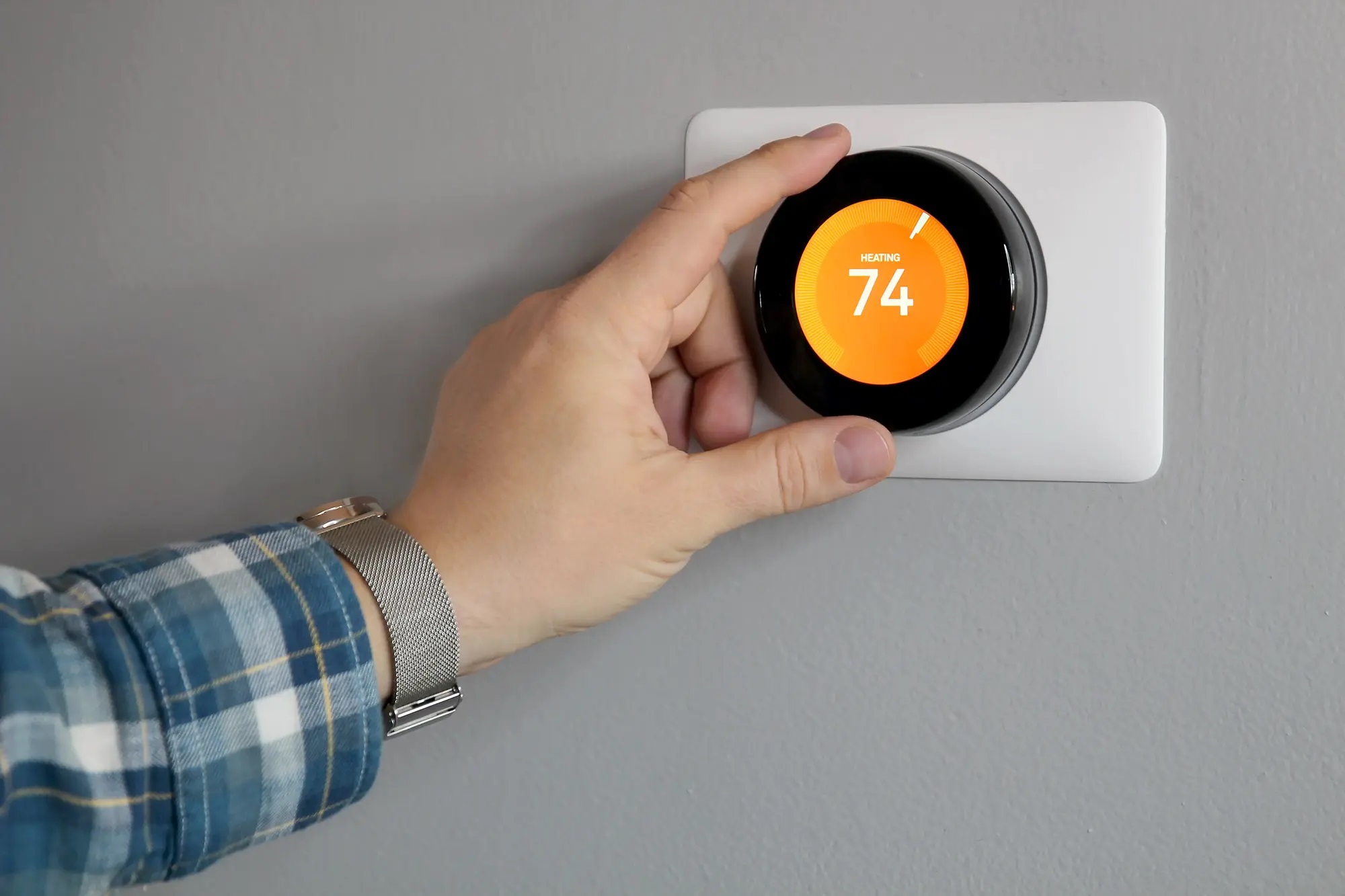An alluring pick for those who want a big OLED display.
There’s no shortage of excellent 16-inch Windows laptops available in 2024, but the bulk of these laptops are, well, bulky. Acer’s Swift Edge 16 is among the few to deliver a 16-inch display in a laptop that weighs under three pounds, and it pairs a thin, light profile with good all-around performance and an affordable price tag. But keeping the price and weight low requires compromise and, in this case, it’s battery life that takes the hit.
Acer Swift Edge 16: Specs and features
The Acer Swift Edge 16 is powered by an AMD Ryzen 7 8840U processor, which has eight cores and 16 threads. It’s paired with 16 GB of RAM and AMD’s integrated Radeon 780M graphics, which includes 12 graphics cores. The laptop also has a 16-inch OLED display with a stunning resolution of 3200×2000 pixels and a maximum refresh rate of 120 Hz.
- CPU: AMD Ryzen 7 8840U
- Memory: 16GB LPDDR5
- Graphics/GPU: AMD Radeon 780M
- Display: 16-inch OLED 3200×2000 120Hz refresh rate with HDR support
- Storage: 1TB PCIe Gen 4 solid state drive
- Webcam: 1440p with dual-mic array
- Connectivity: 2x USB-C 4 with DisplayPort Alternate Mode and 65 watts Power Delivery, 2x USB-A 3.2 Gen 1, 1x HDMI 2.1, 1x microSD card reader, 1x 3.5mm combo audio jack
- Networking: Wi-Fi 7, Bluetooth 5.3
- Biometrics: Fingerprint reader
- Battery capacity: 54 watt-hours
- Dimensions: 14.18 x 9.78 x 0.72 inches
- Weight: 2.71 pounds
- MSRP: $1,299.99
Acer currently sells just one configuration of the new Swift Edge 16, which is the configuration reviewed. It carried an MSRP of $1,300 at the time the system was tested. Though not a budget laptop, the Swift Edge 16’s price is reasonable considering the processor, OLED display, and other hardware that Acer includes. LG’s Gram 16 and SuperSlim laptops, though comparable in size and weight, are often more expensive with models starting around $1,400 (with less RAM and storage).
Acer Swift Edge 16: Design and build quality
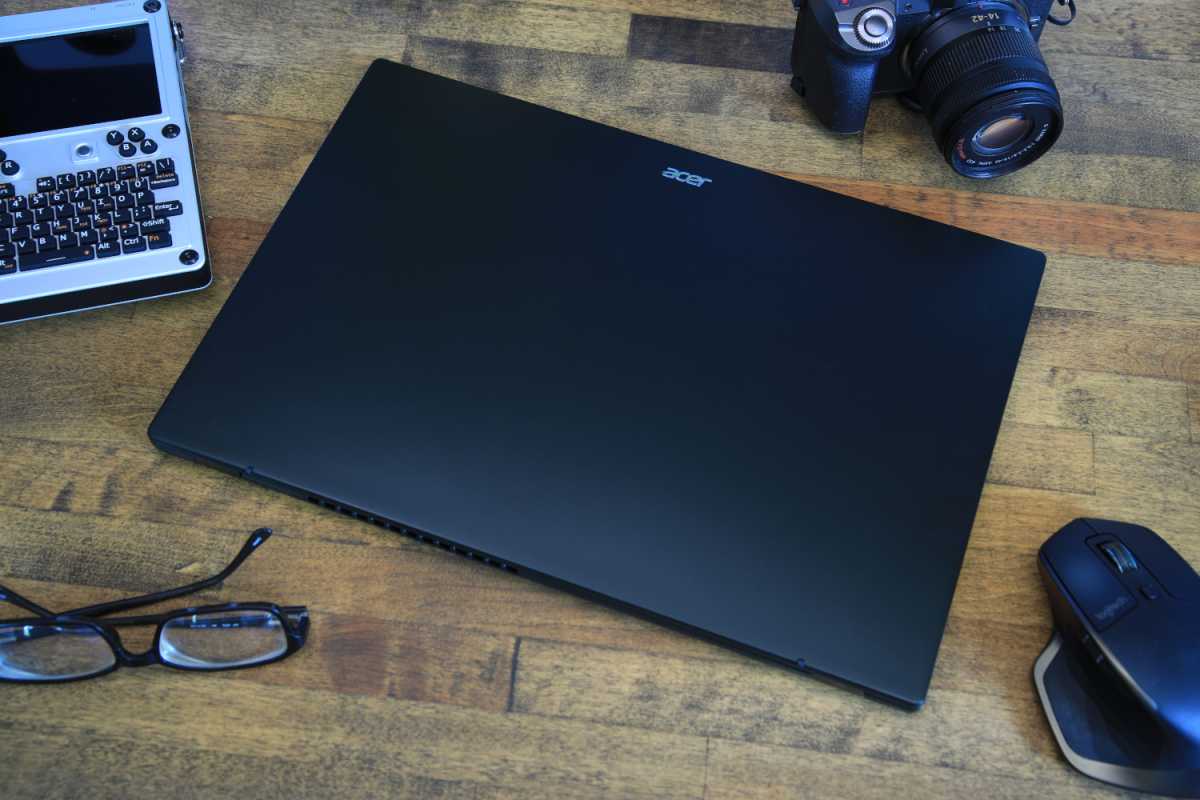
IDG / Matthew Smith
The Acer Swift Edge 16 doesn’t make a great first impression out of the box. It’s a simple, matte black slate that lacks any detail, flair, or texture. There’s nothing wrong with the design, but shoppers craving a premium look will need to look elsewhere.
Build quality is a similar story. The laptop is built from magnesium-aluminum alloy, a strong yet light material frequently used by ultra-thin PC laptops. However, the alloy lacks the rigidity of brushed aluminum; in fact, it’s easy to mistake for plastic. The laptop’s lack of rigidity and heft makes it feel like an inexpensive, budget-oriented machine.
The magnesium-aluminum alloy does its job, however. The Swift Edge 16 weighs just 2.71 pounds and measures no thicker than 0.72 inches. Its weight is especially low for a 16-inch laptop; only LG Gram laptops are drastically lighter. It’s easy to forget the Acer is in a backpack once stowed, and picking up the laptop from an edge or corner is hardly a strain. That makes the Swift Edge 16 attractive if you travel often but also want a large display.
Acer Swift Edge 16: Keyboard, trackpad
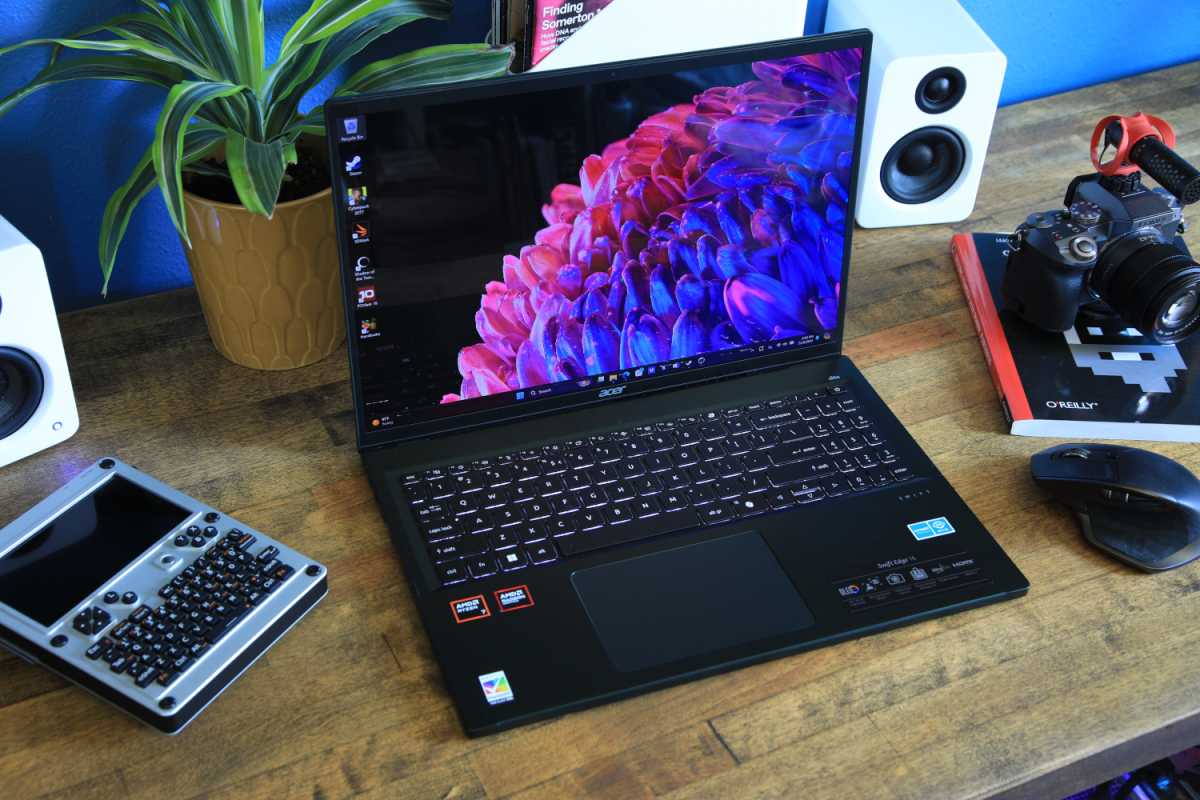
IDG / Matthew Smith
An enjoyable keyboard and number pad stretches across the Acer Swift Edge 16’s interior. The layout is spacious, although some keys, such as the number pad keys, are slightly undersized. Key travel is lengthy and ends with definitive bottoming action that provides some tactile feedback. It’s not an amazing keyboard, but it’s surprisingly good for a thin, lightweight laptop.
The keyboard includes a backlight that’s extremely bright at its maximum setting, so visibility is never an issue. Acer also packs the usual array of function keys, including the new Copilot key, and a shortcut to open the Acer software which manages most laptop settings.
A responsive and large touchpad sits below the keyboard at an offset to the space bar, which means there’s less palm space on the left than on the right. The touchpad surface measures about five inches wide and three and a quarter inches deep. Though not as large as the touchpads found on premium competitors like a Dell XPS 16, it still provides plenty of room for activating multitask gestures, and is similar in size, or slightly larger than, the touchpads on price-competitive laptops like the Asus Vivobook 16 and Dell Inspiron 16.
Acer Swift Edge 16: Display, audio
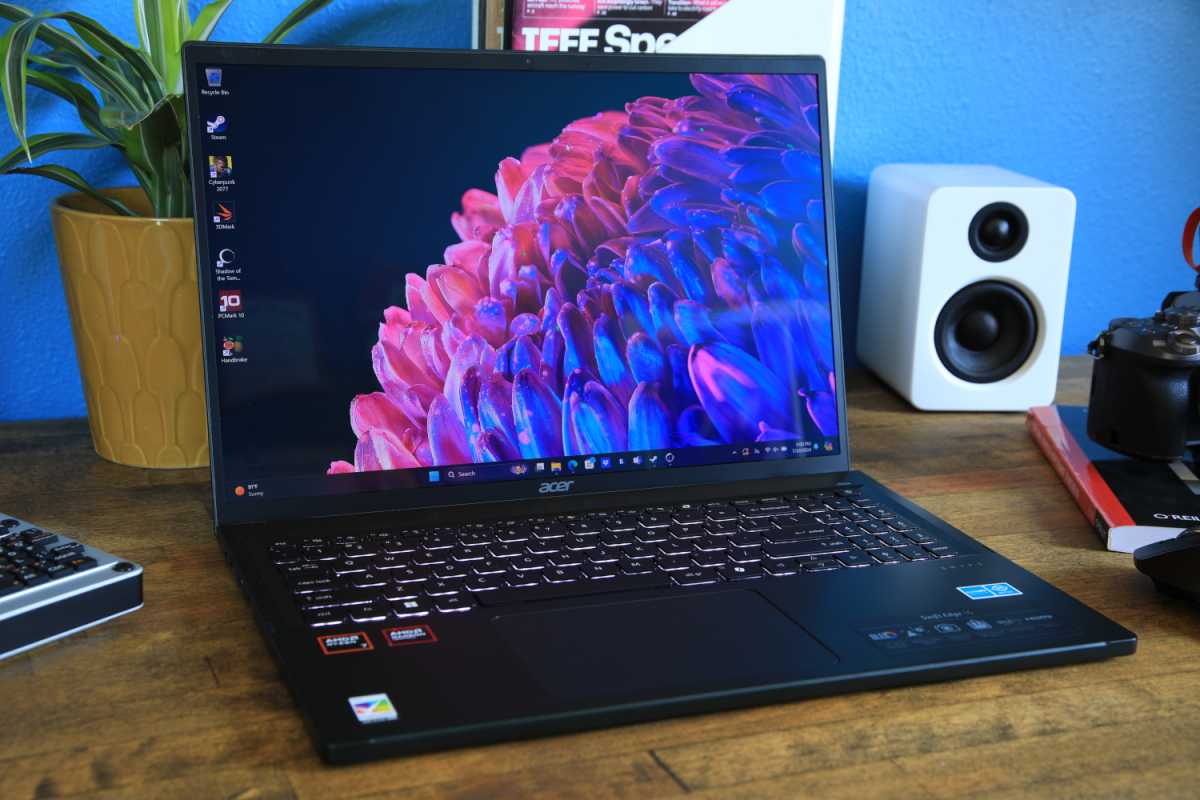
IDG / Matthew Smith
Acer equips the Swift Edge 16 with a 16-inch OLED display with a resolution of 3200 x 2000 pixels, which works out to a pixel density of 235 pixels per inch. That beats not only 1080p laptop displays but also a 4K 27-inch or 32-inch monitor. You’ll only see a crisper picture if you pick up a laptop with a 4K display, but those are relatively uncommon and, at this size, 4K’s advantage is hard to notice in most situations.
Acer’s Swift Edge 16 is an affordable and alluring pick for people who want a 16-inch laptop with a beautiful display, yet also prefer a laptop that’s thin, light, and affordable.
The OLED display also has a maximum refresh rate of 120Hz, which is always great to see. In addition to better motion fluidity and clarity in PC games, the higher refresh rate offers a more responsive experience on the Windows desktop compared to a 60Hz refresh rate. It is a subtle difference but noticeable, especially if you go back to a 60Hz display after using the Swift Edge 16’s 120Hz OLED display.
Acer also benefits from the usual strengths of OLED. The display has an excellent contrast ratio, extremely wide color gamut, and great color accuracy. It looks vibrant, crisp, and immersive across a wide range of content, from photo editing to PC games. HDR is supported, too, and while HDR brightness isn’t outstanding, it does deliver a slight boost to detail and immersion.
While the display is excellent, it doesn’t provide Acer much edge against its competition. OLED displays are now widely available, and most deliver similar benefits. The Swift Edge 16 is affordable for a laptop with a 16-inch OLED display, but the Asus Vivobook Pro 16 isn’t much more expensive (though, to be fair, it’s much heavier than the Acer Swift Edge 16).
Audio quality is disappointing. The Acer’s built-in speakers deliver passable volume at their maximum setting, but turning the volume up that high can severely muddy the mid-range when playing music or watching an action movie. External speakers or headphones are recommended.
Acer Swift Edge 16: Webcam, microphone, biometrics
A 1440p webcam is nestled in the Acer Swift Edge 16’s top bezel. It delivers good sharpness and color for a laptop webcam, which will help you look your best on video calls. With that said, it can still struggle to find an appropriate level of exposure in especially bright or dark rooms. The microphone is similarly capable, picking up crisp dialogue with minimal to modest background noise.
Biometric login is available through a fingerprint reader integrated into the power button. It works well enough but, like other fingerprint readers, it can be fooled if your finger is even slightly damp or dirty—so keep your hand out of that Cheetos bag.
Acer Swift Edge 16: Connectivity
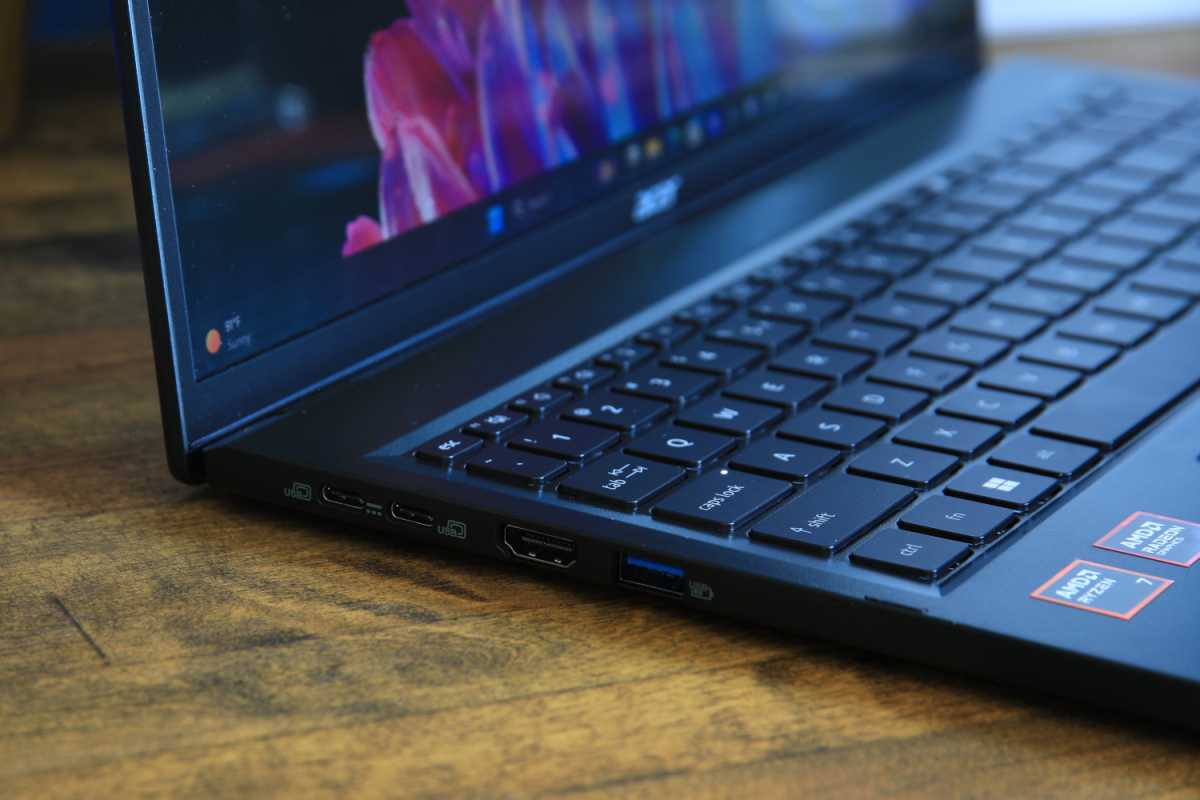
IDG / Matthew Smith
The Acer Swift Edge 16 packs a good mix of future-proof and legacy connectivity.
It has two USB-C 4 ports, both which support DisplayPort Alternate Mode and up to 65 watts of Power Delivery. They can be used to charge the laptop and/or connect a monitor over USB-C or DisplayPort (with an adapter). Acer also ships the laptop with a small 65-watt power adapter for charging the laptop. The USB-C port’s versatility is convenient while traveling. You can pack a single 65-watt USB-C adapter for your laptop, phone, and other devices.
USB-C is paired with two USB-A ports, so it’s possible to connect a wired keyboard and mouse at once. Dedicated video-out is provided by HDMI 2.1, and the laptop also has a microSD card reader with support for cards up to 512GB in size. Ethernet is the only physical connectivity notably absent, but that’s also true for most laptops of similar weight and size.
Acer’s wireless connectivity is excellent, as the laptop supports both Wi-Fi 7 (the latest version of the Wi-Fi standard) and Bluetooth 5.3. This should futureproof the Acer’s wireless connectivity, since Wi-Fi 7 was just released. It also makes the loss of physical Ethernet a bit less painful, since Wi-Fi 7 can exceed Gigabit Ethernet speeds in optimal conditions (though keep in mind you’ll need a Wi-Fi 7 router, too).
Acer Swift Edge 16: Performance
The Acer Swift 16 Edge has an AMD Ryzen 7 8840U processor with eight cores, sixteen threads, and a maximum boost clock of 5.1GHz. It has performed well in our prior tests of other laptops, and has potentially strong integrated graphics in the form of AMD’s Radeon 780M. The Swift 16 Edge’s overall performance is strong, though it doesn’t stand out from the crowd.
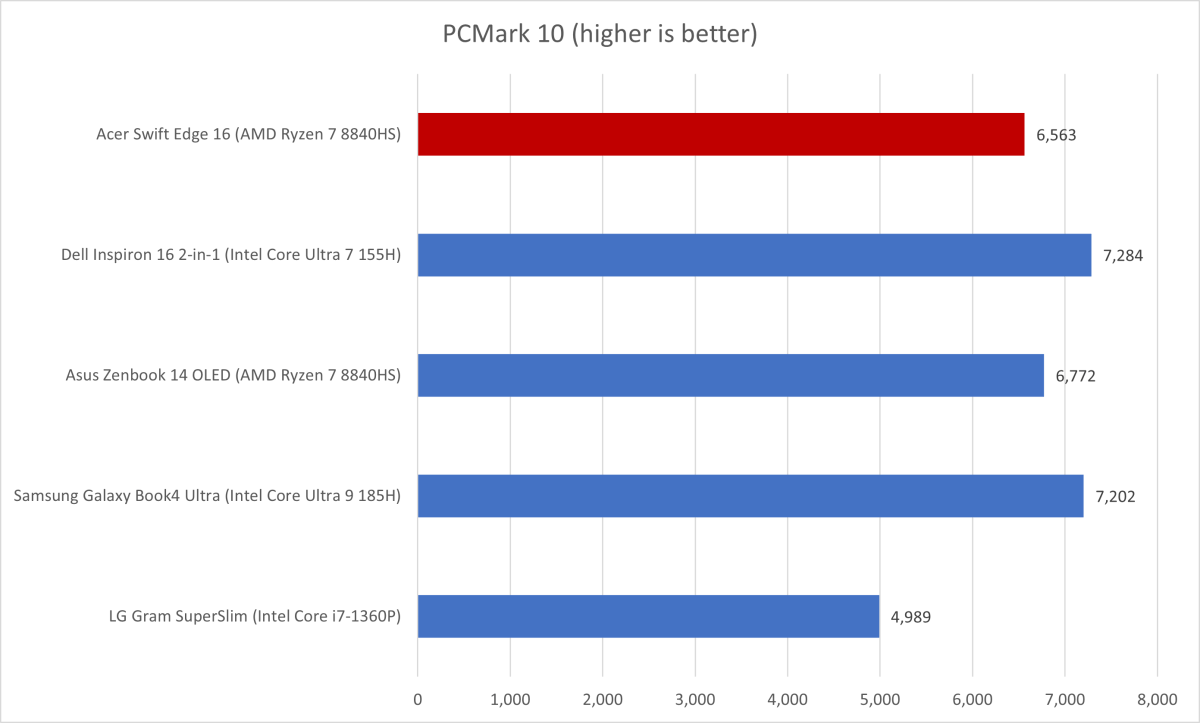
IDG / Matthew Smith
Acer’s laptop gets off to a tepid start in PCMark 10, a general synthetic benchmark that tests multiple elements of system performance. It returns a score of 6,563 which, though respectable, falls a tad behind other recent AMD Ryzen 7 and Intel Core Ultra systems. The older LG Gram SuperSlim, which we reviewed with an older Intel Core i7-1360P processor, is the only laptop that falls way behind the pack.
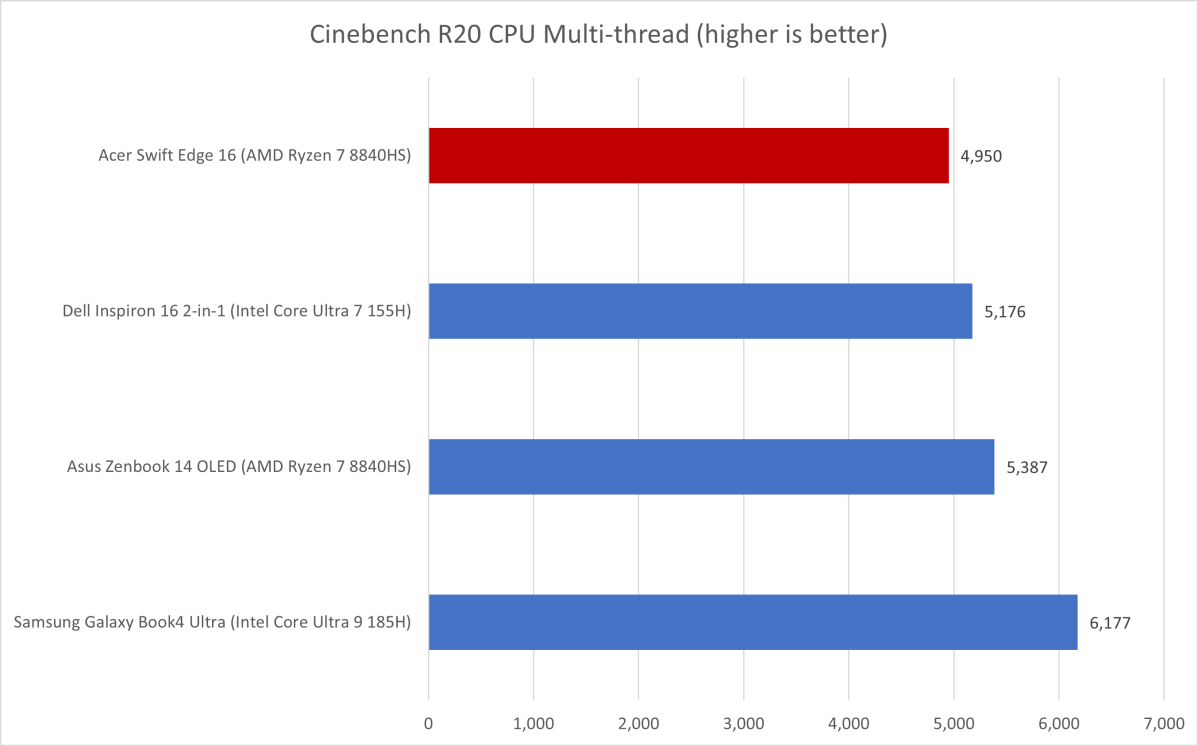
IDG / Matthew Smith
Cinebench R20, a multi-threaded CPU benchmark, produces a reasonable but uninspired result on the Swift Edge 16. It’s not much slower than the competition, but does fall behind overall. That’s difficult to justify: the Acer is inexpensive, but the Dell Inspiron 16 is even more affordable.
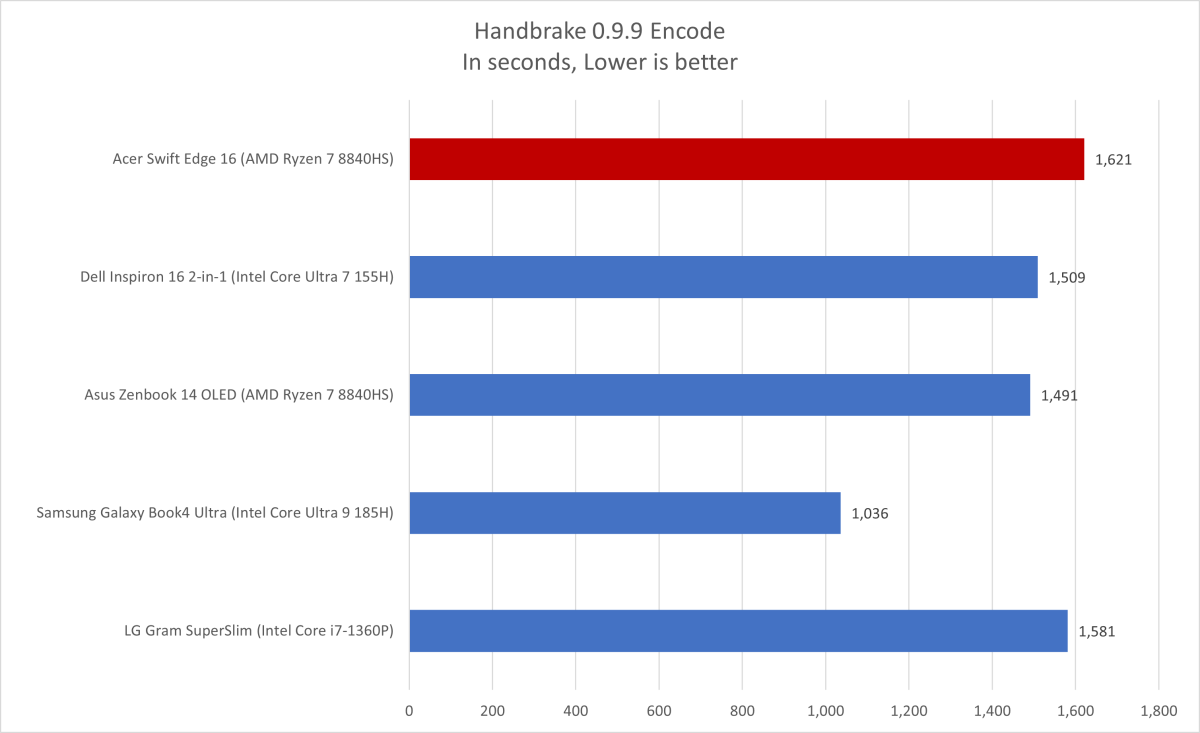
IDG / Matthew Smith
Handbrake continues the Swift Edge 16’s trend of acceptable but modest results. It required more than 26 minutes to grind through a test encoding a two-hour-long movie from MP4 to MKV format, which is slower than the laptops chosen for comparison. In truth, the difference is slim enough that it wouldn’t be a real-world problem, but it’s still a loss for the Acer.
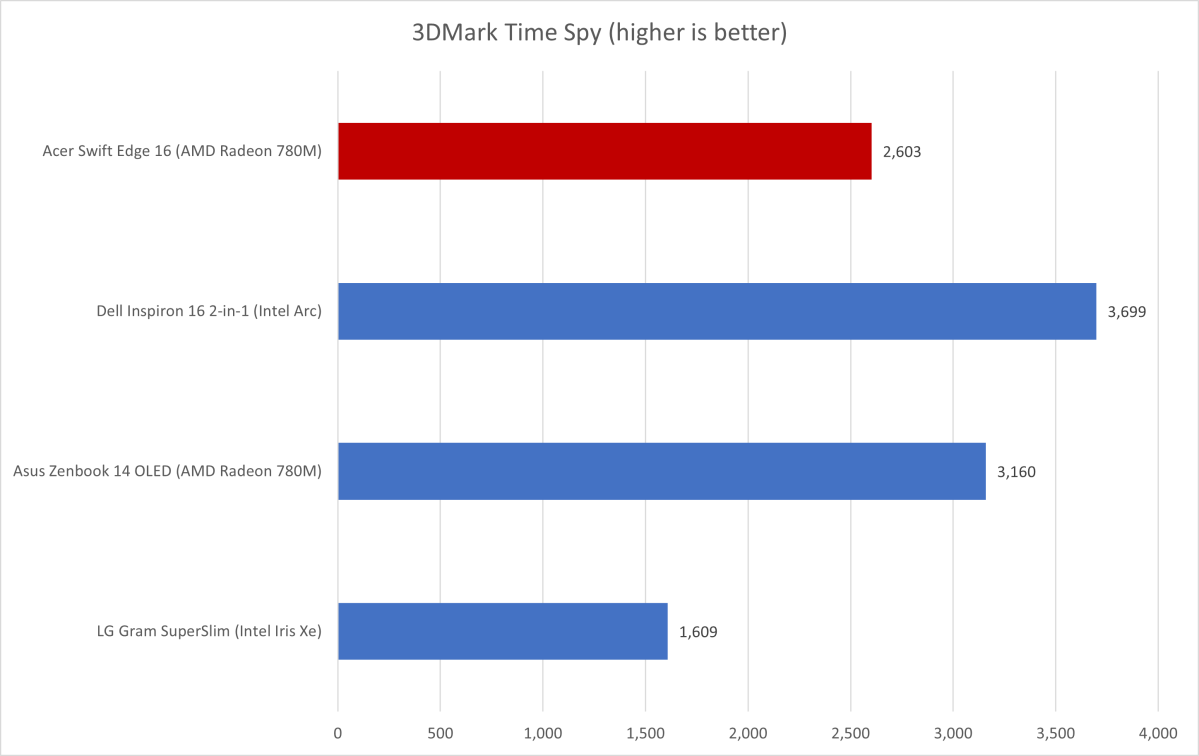
IDG / Matthew Smith
The Ryzen 7 8840U packs an AMD Radeon 780M with 12 graphics cores. It sounds good on paper, but Swift Edge 16 achieved a mediocre Time Spy score. That’s acceptable if you just want to play older 3D titles or games with generally less demanding graphics, but it’s not going to hold up in modern AAA titles.
The Swift Edge 16’s result also lands it significantly behind some competitors with Intel Arc and AMD Radeon 780M graphics. The Dell Inspiron 16 2-in-1 with Intel Arc integrated graphics was over 40 percent quicker in this test. That’s a big gap.
Acer Swift Edge 16: Battery life
Acer’s decision to keep the Swift Edge 16’s weight well below three pounds makes it easy to pick up and toss in a bag, but also limits battery life. The Swift Edge 16 has a small 54 watt-hour battery that drains more quickly than I’d like.
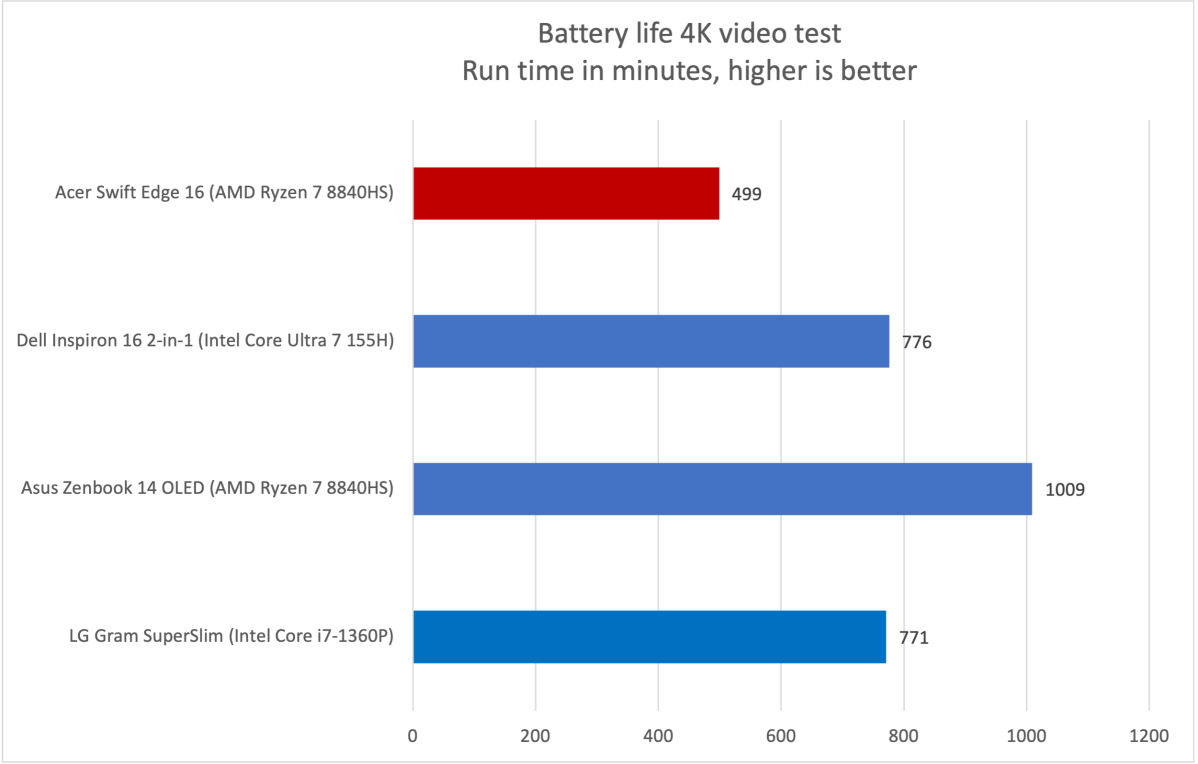
IDG / Matthew Smith
I saw a little over seven and a half hours of battery life in PC World’s standard battery test, which loops a 4K file of the short film Tears of Steel. This is a light workload by modern standards, and the Swift Edge 16’s real-world battery life was equally unimpressive. I saw about six to seven hours of endurance while browsing the web and writing in Google Docs.
That’s not going to be enough if you want a laptop that can handle an eight-hour workday without needing to top off, and it’s less than what most 16-inch laptops offer. The recent release of Qualcomm-powered Copilot Plus PCs, which can exceed 20 hours in this test, makes slim battery life especially hard to accept.
Acer Swift Edge 16: Conclusion
Acer’s Swift Edge 16 is an affordable and alluring pick for people who want a 16-inch laptop with a beautiful display, yet also prefer a laptop that’s thin, light, and affordable. The Swift Edge 16 is generally less expensive than competitive Windows laptops that have similar hardware and a thin-and-light design.
However, Acer is forced to reduce the size of the battery to keep the laptop’s weight low, which leads to disappointing battery life: an especially notable problem now that Copilot Plus PCs with up to 20 hours of battery life are available. The Swift Edge 16’s performance is also a bit weak. In most cases it won’t be noticeably slower than its peers, but it fell behind in benchmarks.
If you can excuse that, though, the Swift Edge 16 is a less expensive alternative to featherweight competitors like the LG Gram.

